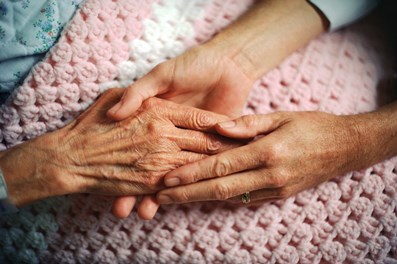 Thankfully, very few of us have extensive experience observing and caring for someone in their last days. As caregivers, we hope to be prepared for this time and to make these moments as valuable and comfortable as possible for our loved ones and ourselves.
Thankfully, very few of us have extensive experience observing and caring for someone in their last days. As caregivers, we hope to be prepared for this time and to make these moments as valuable and comfortable as possible for our loved ones and ourselves.
This is the time to gather the family to say final goodbyes to their loved one. They may take turns with the patient, holding hands, talking to him or her, or just sitting quietly. It is also a time to perform any religious ceremonies or other activities the patient wants before death. It is a chance for families and friends to express their love and appreciation for the patient and for each other.
It is important to have a plan for what to do at the time of death, so that the family will be prepared to carry out necessary actions during this very emotional time. If the patient is in hospice, the hospice nurse and social worker will help you. If the patient is not in hospice, talk with the doctor about it so that you will know what to do.
The American Cancer Society describes many of the typical changes in body function, consciousness, metabolism, etc, that occur as death approaches, and how the caregiver can help. Not all of the symptoms illustrated will happen, but it may help you to know about them.
After the Death
Be sure to pay attention to this important note: If you call 911 or emergency medical services (EMS), even after an expected death at home, the law often requires EMS personnel to try to revive the patient or take him or her to a hospital. This can complicate the situation. Be sure that family and friends are ready and know exactly whom to call, so that they don't dial 911 in confusion or panic.
Places to notify after a death:
- The Social Security Office. The mortuary will notify them, but a family member should call the office at 800-772-1213 within a week or two to verify any changes in benefits. Note: There is a death benefit of $255, but it is paid only if there is a surviving spouse or eligible children, and directly to them.
- Any companies where investments are held
- All insurance companies, retirement plans, and fraternal benefit programs
- Title companies for property. Be aware that if you want to sell property, you will need a copy of the death certificate.
- Department of Motor Vehicles to change the name on vehicle titles
- Attorney, if probate is necessary
- Insurance policies, benefit programs, investments, and bank accounts, to change the beneficiary
You will need a certified copy of the death certificate to file with the income taxes for the year of death, if applicable.
